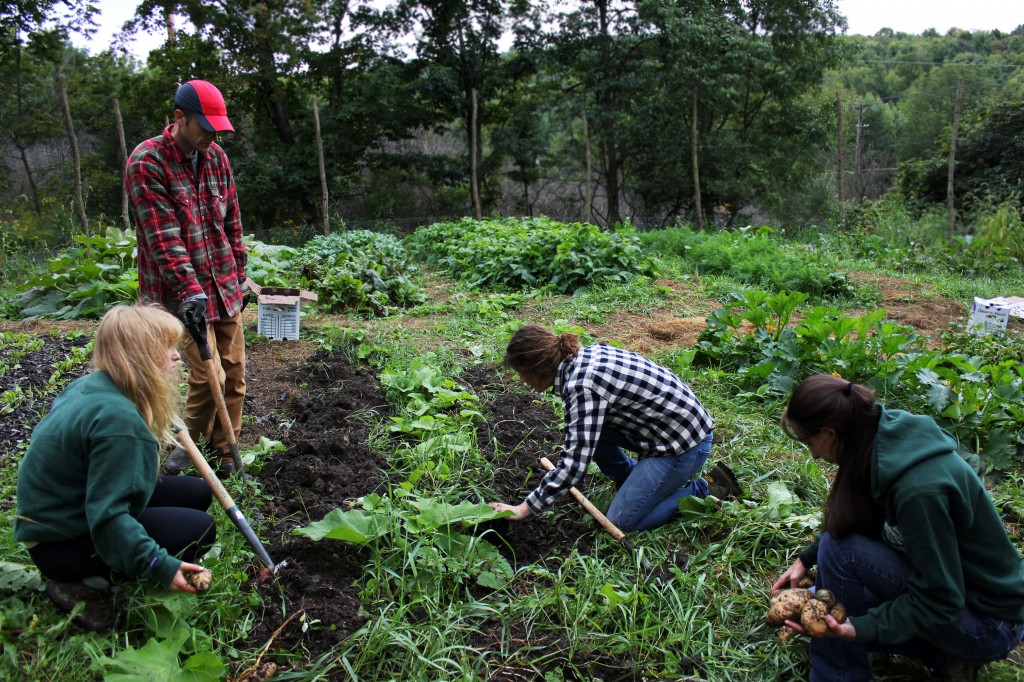
The Binghamton University Acres Farm Project is bringing locally grown food closer to home and straight to campus.
The two-acre farm is run by Binghamton students and grows sustainable and pesticide-free food that will be served on campus.
The project is primarily run through Auxiliary Services, but receives aid from many different groups such as Volunteers Improving Neighborhood Environments (VINES), which bought the start-up seeds, Intellectual Decisions on Environmental Awareness Solutions (IDEAS), which helped advertise, and Off Campus College Transport (OCCT), which provides transportation to the farm.
“We want this to be a campus-wide effort to increase awareness about our food system, and a learning experience for anyone who wants to get involved,” Jillian Shotwell, co-founder and student manager for Acres and a senior double-majoring in environmental studies and geography, wrote in an email. “Sodexo has donated all food for our work days, provides us with more compost than we could ever dream of, and supports the project wholeheartedly with no monetary benefit to themselves. They have really been wonderful.”
The produce grown at the farm, which includes carrots, beets, zephyr squash, zucchini, kale, swiss chard, green beans, potatoes, apples and pears, is given out for free at the College-in-the-Woods Dining Hall in the ‘gifts of the garden’ section. The plants are fertilized with free compost from CIW Dining Hall, in cooperation with chef manager Rich Herb.
“The original intention of the farm was to create a closed loop between the composted waste coming out of the College-in-the-Woods dinning hall and the production of food at Binghamton University Acres Farm,” said Sean Cummings, garden supervisor at BU Acres.
Shotwell said she hopes the farm can expand to the point that it starts to make money.
“We are hoping to become a vendor to Sodexo within the next few weeks; this means that any profit made off of the food will go directly back to farm development,” Shotwell wrote. “During the off season, we plan to donate the food to CHOW (Community Hunger Outreach Warehouse) and other similar organizations.”
Acres opened up the farm in spring 2013 on Bunn Hill and has since been named Binghamton University’s Outstanding New Program of the Year.
“Our farm is off the grid, other than our brush hog mower. This means that all garden beds are dug by hand, all brush is cleared by volunteers, and everything is done using manual labor,” Shotwell wrote.
Mary Dribnak, an intern receiving credit for her work at Binghamton Acres and a senior majoring in environmental planning, is expecting growth on the farm over the next few months.
“In the future, we plan to continue to expand the farm,” Dribnak wrote in an email. “We currently have a vegetable garden and an orchard, but up until mid-October we will be working on several projects which include a second vegetable garden, a mushroom garden, developing the orchard and finishing the rain garden.”
Carl Esther, a junior majoring in linguistics, feels good about the inclusion of local, organically grown food in the CIW dining hall.
“Honestly, I feel really good about what Acres is doing, making the choice of food here more organic,” Esther said. “It makes sense since we are right by so many farms here, it makes me feel at ease that the unused food does not go to waste.”
Nicole Ochonma, a sophomore majoring in integrative neuroscience, said she is interested in getting involved with Acres as an effort to give back.
“What’s great about [the farm volunteers] is that they are students going to Binghamton, so they know the food choices available here and really cater to what the student body needs.” Ochonma said. “I would like to get involved [with Acres] because I like to take part in things that help the people around me.”


